Deck 11: Fundamentals of Packet Routing
Question
Question
Question
Question
Question
Question
Question
Question
Question
Question
Question
Question
Question
Question
Question
Question
Question
Question
Question
Question
Question
Question
Question
Question
Question
Question
Question
Question
Question

Unlock Deck
Sign up to unlock the cards in this deck!
Unlock Deck
Unlock Deck
1/29
Play
Full screen (f)
Deck 11: Fundamentals of Packet Routing
1
Choose a CORRECT statement about the Internet Service Provider (ISP).
A) Regional ISPs are classified as Tier 1 ISPs.
B) The networks of Tier 1, Tier 2, and Tier 3 ISPs become the Internet backbone.
C) The Internet backbone is mostly owned by governments.
D) The National ISP's network should provide bridging between the Local ISP and Regional ISP networks.
E) The Local and Regional ISP networks are called feeder networks.
A) Regional ISPs are classified as Tier 1 ISPs.
B) The networks of Tier 1, Tier 2, and Tier 3 ISPs become the Internet backbone.
C) The Internet backbone is mostly owned by governments.
D) The National ISP's network should provide bridging between the Local ISP and Regional ISP networks.
E) The Local and Regional ISP networks are called feeder networks.
E
2
Choose an INCORRECT statement about the Autonomous System (AS).
A) Routers within an AS use a uniform set of policies for packet routing.
B) The AS becomes a routing domain.
C) Multiple small businesses can belong to the same AS of an ISP.
D) IXPs bridge ISP networks that belong to different Autonomous Systems.
E) Routers within an AS exchange routing information based on the EGP.
A) Routers within an AS use a uniform set of policies for packet routing.
B) The AS becomes a routing domain.
C) Multiple small businesses can belong to the same AS of an ISP.
D) IXPs bridge ISP networks that belong to different Autonomous Systems.
E) Routers within an AS exchange routing information based on the EGP.
E
3
Choose an INCORRECT statement about the Internet Service Provider (ISP).
A) Point of Presences (POPs) are generally owned by ISPs.
B) The POP of a carrier houses access routers that connect to customer premises.
C) Many carriers run both local/regional ISP and national ISP businesses.
D) Many POPs are interconnected in the ring topology running on optical fibers.
E) With private peering, two ISP networks are connected through an IXP.
A) Point of Presences (POPs) are generally owned by ISPs.
B) The POP of a carrier houses access routers that connect to customer premises.
C) Many carriers run both local/regional ISP and national ISP businesses.
D) Many POPs are interconnected in the ring topology running on optical fibers.
E) With private peering, two ISP networks are connected through an IXP.
E
4
The ______ plays a critical role in enabling IP packet forwarding between autonomous systems.
A) DHCP (dynamic host configuration protocol)
B) OSPF (Open shortest path first)
C) ARP (address resolution protocol)
D) BGP (Border Gateway Protocol)
E) IGP (Interior Gateway Protocol)
A) DHCP (dynamic host configuration protocol)
B) OSPF (Open shortest path first)
C) ARP (address resolution protocol)
D) BGP (Border Gateway Protocol)
E) IGP (Interior Gateway Protocol)

Unlock Deck
Unlock for access to all 29 flashcards in this deck.
Unlock Deck
k this deck
5
Local or regional ISPs typically access the Internet through ________ .
A) internet exchange points
B) internet gateways
C) public switched data networks
D) virtual private networks
E) peer ISPs
A) internet exchange points
B) internet gateways
C) public switched data networks
D) virtual private networks
E) peer ISPs

Unlock Deck
Unlock for access to all 29 flashcards in this deck.
Unlock Deck
k this deck
6
The network access point is equivalent to the ______.
A) private peer
B) internet exchange point
C) internet service provider (ISP)
D) autonomous system (AS)
E) internet gateway
A) private peer
B) internet exchange point
C) internet service provider (ISP)
D) autonomous system (AS)
E) internet gateway

Unlock Deck
Unlock for access to all 29 flashcards in this deck.
Unlock Deck
k this deck
7
Which protocol is fundamentally different from the others in their missions?
A) RIP
B) OSPF
C) IS-IS
D) BGP
E) IP
A) RIP
B) OSPF
C) IS-IS
D) BGP
E) IP

Unlock Deck
Unlock for access to all 29 flashcards in this deck.
Unlock Deck
k this deck
8
Routers can use ________ to advertise their link-state information to other routers (choose a most specific answer).
A) DHCP
B) OSPF
C) ARP
D) IP
E) TCP
A) DHCP
B) OSPF
C) ARP
D) IP
E) TCP

Unlock Deck
Unlock for access to all 29 flashcards in this deck.
Unlock Deck
k this deck
9
Which may NOT be included in the routing table?
A) destination subnetworks
B) subnet masks
C) exit ports
D) next hop IPs
E) host IP addresses
A) destination subnetworks
B) subnet masks
C) exit ports
D) next hop IPs
E) host IP addresses

Unlock Deck
Unlock for access to all 29 flashcards in this deck.
Unlock Deck
k this deck
10
When there is more than one best path for an IP packet in the routing table, their _____ are compared to break the tie?
A) subnet masks
B) exit ports
C) metric values
D) next hop IPs
E) host IP addresses
A) subnet masks
B) exit ports
C) metric values
D) next hop IPs
E) host IP addresses

Unlock Deck
Unlock for access to all 29 flashcards in this deck.
Unlock Deck
k this deck
11
When using the metric value to break a tie between entries in the routing table, the router
A) selects the matching row with the highest metric value.
B) selects the matching row with the lowest metric value.
C) selects the matching row with the latest update value.
D) selects the matching row with the oldest update value.
E) selects the matching row with the highest or lowest value depending on the metric.
A) selects the matching row with the highest metric value.
B) selects the matching row with the lowest metric value.
C) selects the matching row with the latest update value.
D) selects the matching row with the oldest update value.
E) selects the matching row with the highest or lowest value depending on the metric.

Unlock Deck
Unlock for access to all 29 flashcards in this deck.
Unlock Deck
k this deck
12
A router receives an IP packet with destination of 142.66.39.125. What should be its exit port (interface)?
A) A
B) B
C) C
D) D
E) E
A) A
B) B
C) C
D) D
E) E

Unlock Deck
Unlock for access to all 29 flashcards in this deck.
Unlock Deck
k this deck
13
(Refer to the figure below) PC1 is sending a packet to the server. In forwarding the packet, what is R1's next hop IP address? 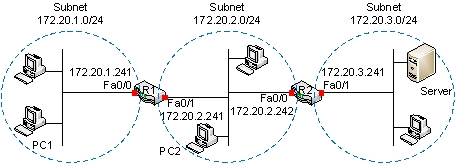
A) 172.20.1.241
B) 172.20.2.241
C) 172.20.2.242
D) 172.20.3.241
E) The server's IP address

A) 172.20.1.241
B) 172.20.2.241
C) 172.20.2.242
D) 172.20.3.241
E) The server's IP address

Unlock Deck
Unlock for access to all 29 flashcards in this deck.
Unlock Deck
k this deck
14
(Refer to the figure below) Which is CORRECT as an entry to the R1's routing table?
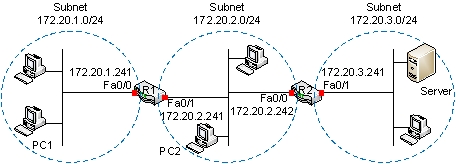
A) A
B) B
C) C
D) D
E) E

A) A
B) B
C) C
D) D
E) E

Unlock Deck
Unlock for access to all 29 flashcards in this deck.
Unlock Deck
k this deck
15
Which may NOT be included in the routing table developed for intra-domain routing?
A) destination network (or subnet) IP addresses
B) subnet masks
C) exit port/interfaces
D) metric values
E) ISP numbers
A) destination network (or subnet) IP addresses
B) subnet masks
C) exit port/interfaces
D) metric values
E) ISP numbers

Unlock Deck
Unlock for access to all 29 flashcards in this deck.
Unlock Deck
k this deck
16
When there is no specific matching between an IP packet's destination and the routing table's entries, which subnet address becomes the default route to move the packet?
A) 0.0.0.0/0
B) 1.1.1.1/0
C) 50.50.50.50/0
D) 100.100.100.100/0
E) 255.255.255.255/0
A) 0.0.0.0/0
B) 1.1.1.1/0
C) 50.50.50.50/0
D) 100.100.100.100/0
E) 255.255.255.255/0

Unlock Deck
Unlock for access to all 29 flashcards in this deck.
Unlock Deck
k this deck
17
To determine which entries of the routing table match the destination address of an arriving IP packet, the router rely on their ______ information.
A) subnet mask
B) metric value
C) exit port/interface
D) default gateway
E) next hop
A) subnet mask
B) metric value
C) exit port/interface
D) default gateway
E) next hop

Unlock Deck
Unlock for access to all 29 flashcards in this deck.
Unlock Deck
k this deck
18
Choose a FALSE statement about routers and routing.
A) The routing table entry with a larger metric value is a better choice if the metric represents bandwidth.
B) ARP is used to advertise information necessary to develop the routing table.
C) Workstations that connect to the Internet have a static routing table.
D) The default gateway is a router port to which IP packets are sent when the destination is not in the same subnet.
E) The border gateway protocol is an exterior gateway protocol.
A) The routing table entry with a larger metric value is a better choice if the metric represents bandwidth.
B) ARP is used to advertise information necessary to develop the routing table.
C) Workstations that connect to the Internet have a static routing table.
D) The default gateway is a router port to which IP packets are sent when the destination is not in the same subnet.
E) The border gateway protocol is an exterior gateway protocol.

Unlock Deck
Unlock for access to all 29 flashcards in this deck.
Unlock Deck
k this deck
19
The destination address of a packet arriving at a router is 100.50.30.10, which routing table entry matches the address?
A) 100.50.0.0/24
B) 100.0.0.0/16
C) 100.50.0.0/20
D) 100.48.30.0/21
E) 100.50.0.0/16
A) 100.50.0.0/24
B) 100.0.0.0/16
C) 100.50.0.0/20
D) 100.48.30.0/21
E) 100.50.0.0/16

Unlock Deck
Unlock for access to all 29 flashcards in this deck.
Unlock Deck
k this deck
20
Which is the longest match of the IP address 100.50.30.10?
A) 100.50.0.0/24
B) 100.0.0.0/8
C) 100.50.30.0/20
D) 100.50.30.0/22
E) 100.50.0.0/16
A) 100.50.0.0/24
B) 100.0.0.0/8
C) 100.50.30.0/20
D) 100.50.30.0/22
E) 100.50.0.0/16

Unlock Deck
Unlock for access to all 29 flashcards in this deck.
Unlock Deck
k this deck
21
(Refer to the figure below) What will be the PC1's default gateway address to the Internet? 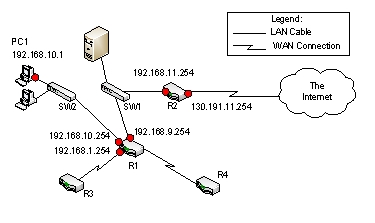
A) 192.168.9.254
B) 192.168.10.254
C) 192.168.10.1
D) 192.168.11.254
E) 130.191.11.254

A) 192.168.9.254
B) 192.168.10.254
C) 192.168.10.1
D) 192.168.11.254
E) 130.191.11.254

Unlock Deck
Unlock for access to all 29 flashcards in this deck.
Unlock Deck
k this deck
22
A router receives a packet with 11.87.234.111 as the destination. Given the partial routing table below, what should be the exit interface of the packet?
A) S0/0/0
B) S0/0/2
C) S0/0/1
D) Fa0/0
E) Fa0/1
A) S0/0/0
B) S0/0/2
C) S0/0/1
D) Fa0/0
E) Fa0/1

Unlock Deck
Unlock for access to all 29 flashcards in this deck.
Unlock Deck
k this deck
23
What is the meaning of the subnet address 0.0.0.0 with the subnet mask 0.0.0.0 as an entry of the routing table?
A) directly connected route
B) default route
C) default gateway
D) static route
E) has no specific meaning
A) directly connected route
B) default route
C) default gateway
D) static route
E) has no specific meaning

Unlock Deck
Unlock for access to all 29 flashcards in this deck.
Unlock Deck
k this deck
24
(Refer to the figure below) Link-state protocols such as OSPF advertise link (connection) information of a router to other routers. When R1 advertises link-state, that advertisement should include information of how many links? Assume that all three routers are running OSPF. 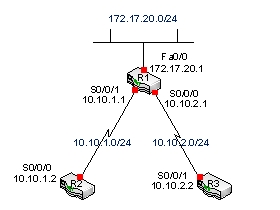
A) 1
B) 2
C) 3
D) 4
E) 5

A) 1
B) 2
C) 3
D) 4
E) 5

Unlock Deck
Unlock for access to all 29 flashcards in this deck.
Unlock Deck
k this deck
25
(Refer to the figure below) Which may NOT be the link-state information related to S0/0/0 (Link 1) of R1? 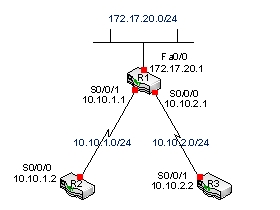
A) subnet address of a link
B) subnet mask of a link
C) type of a link (ex. Ethernet)
D) transmission cost (metric) of a link
E) R1's operating system

A) subnet address of a link
B) subnet mask of a link
C) type of a link (ex. Ethernet)
D) transmission cost (metric) of a link
E) R1's operating system

Unlock Deck
Unlock for access to all 29 flashcards in this deck.
Unlock Deck
k this deck
26
Which is LEAST likely used as a metric variable of the routing table?
A) Node count: The number of switches and access points an IP packet pass through to reach the destination.
B) Bandwidth: The combined bandwidth of all links of a delivery path.
C) Delay: The estimated delay of a particular path decided by the link type to a router port.
D) Reliability: The probability of link-failure.
E) Load: The rate of link utilization as a percentage out of 100 (completely utilized).
A) Node count: The number of switches and access points an IP packet pass through to reach the destination.
B) Bandwidth: The combined bandwidth of all links of a delivery path.
C) Delay: The estimated delay of a particular path decided by the link type to a router port.
D) Reliability: The probability of link-failure.
E) Load: The rate of link utilization as a percentage out of 100 (completely utilized).

Unlock Deck
Unlock for access to all 29 flashcards in this deck.
Unlock Deck
k this deck
27
You are a Cisco engineer, and just configured a router port using the following three commands.
(1) R1(config)# interface Fastethernet0/0
 (2) R1(config-if)# ip address 172.20.1.254 255.255.255.0
(2) R1(config-if)# ip address 172.20.1.254 255.255.255.0
 (3) R1(config-if)# no shutdown
(3) R1(config-if)# no shutdown
 Then, the commands must create a(n) _________ entry in the routing table?
Then, the commands must create a(n) _________ entry in the routing table?
A) directly connected route
B) static route
C) dynamic route
D) default route
E) The commands do not add an entry to the routing table
(1) R1(config)# interface Fastethernet0/0
 (2) R1(config-if)# ip address 172.20.1.254 255.255.255.0
(2) R1(config-if)# ip address 172.20.1.254 255.255.255.0 (3) R1(config-if)# no shutdown
(3) R1(config-if)# no shutdown Then, the commands must create a(n) _________ entry in the routing table?
Then, the commands must create a(n) _________ entry in the routing table?A) directly connected route
B) static route
C) dynamic route
D) default route
E) The commands do not add an entry to the routing table

Unlock Deck
Unlock for access to all 29 flashcards in this deck.
Unlock Deck
k this deck
28
Think of the following situations:
There is a need to add a default route to the routing table.
There is little need for changing an entry (or entries).
The corporate network is small with two routers.
Then, adding __________ to their routing table make much sense.
A) directly routes
B) static routes
C) dynamic routes
D) default routes
E) shortcut routes
There is a need to add a default route to the routing table.
There is little need for changing an entry (or entries).
The corporate network is small with two routers.
Then, adding __________ to their routing table make much sense.
A) directly routes
B) static routes
C) dynamic routes
D) default routes
E) shortcut routes

Unlock Deck
Unlock for access to all 29 flashcards in this deck.
Unlock Deck
k this deck
29
Static vs. dynamic updates of routing table are compared. Which is INCORRECT?
A) A
B) B
C) C
D) D
E) E
A) A
B) B
C) C
D) D
E) E

Unlock Deck
Unlock for access to all 29 flashcards in this deck.
Unlock Deck
k this deck


